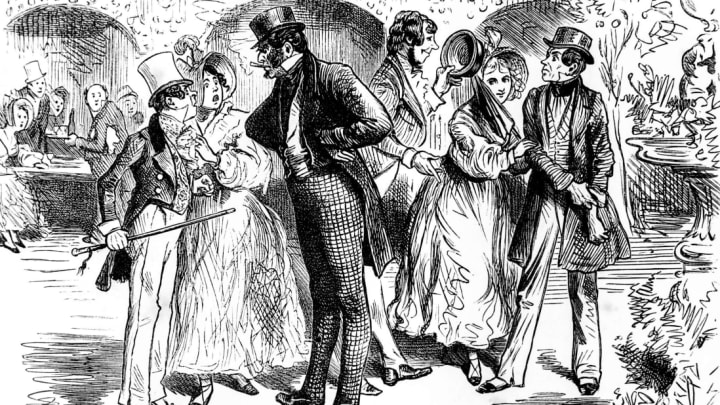With the help of social media, slang words and phrases can gain momentum around the globe in what feels like mere minutes. But trendy terms were making splashes long before YouTubers were stanning guyliner-wearing pop stars who slay all day and woke Gen Z-ers were tweeting their hot takes about fake news, mansplaining, and more.
In a new study, digital subscription service Readly analyzed data from its magazine archives to identify some popular terms from years past and present and pinpoint exactly when they stopped appearing in print. Among more positive terms like crinkum-crankum (“elaborate decoration or detail”) and sweetmeat (“item of confectionery or sweet food”) lies a treasure trove of delicious insults that have all but disappeared—and could definitely add some color to your future squabbles.
View Readly’s full timeline of terms here, and read on to find out which insults were our favorites.
1. Loathly
This alternate form of loathsome, meaning “repulsive,” had an impressive run as an insult for nearly 900 centuries, starting in 1099 and not falling out of public favor until 1945.
2. Purblind
According to the Merriam-Webster entry, purblind originally meant “blind” during the 1400s, and later became a way to indicate shortsightedness or lack of insight.
3. Poltroon
The next time you encounter an “utter coward,” you can call them a poltroon. They’re probably too much of a poltroon to ask you what poltroon means.
4. Slugabed
Though this term for “a person who stays in bed late” hasn’t been used much since the early 20th century, it’s the perfect insult for your roommate who perpetually hits the snooze button.
5. Mooncalf
This obscure term for a foolish person also once meant a "fickle, unstable person," according to the Oxford English Dictionary.
More Articles About Insults:
6. Fainéant
Fainéant derives from fait-nient, French for “doing nothing.” Its tenure as a popular insult for “an idle or ineffective person” lasted from 1619 to 1670, but the fainéants themselves didn’t disappear with the term—there’s one in practically every group project.
7. Otiose
If you want to pack an extra punch when you accuse someone of being a fainéant, you could also call them otiose, meaning “lazy” or “slothful.”
8. Scaramouch
In Italy’s commedia dell’arte—a type of theatre production with ensemble casts, improvisation, and masks—Scaramouch was a stock character easily identified by his boastful-yet-cowardly manner. Much like scrooge is now synonymous with miser, the word scaramouch was used from the 1600s through the 1800s to describe any boastful coward. Wondering why the obsolete expression sounds so familiar? The band Queen borrowed it for their operatic masterpiece “Bohemian Rhapsody,” though scaramouches aren’t necessarily known for doing the fandango.
9. Quidnunc
From the Latin phrase quid nunc, or “What now?”, a quidnunc is an “inquisitive, bossy person” who’s constantly sniffing around for the next juicy morsel of gossip. Usage dropped off in the early 20th century, but you can always bring it back for that friend who unabashedly reads your text messages over your shoulder.
10. Sciolist
A sciolist is someone “who pretends to be knowledgeable.” Though they might fool a mooncalf or two, any expert would see through their facade.
11. and 12. Rapscallion and Scapegrace
Rapscallion and scapegrace are both wonderful ways to offend a mischievous person—if such a person would even be offended—that overlapped in popularity between the 1700s and the 1900s. While scapegrace refers to an incorrigible character who literally escaped God’s grace, rapscallion is an embellished version of the identically defined (but rather less fun to say) word rascal.
[h/t Readly]
